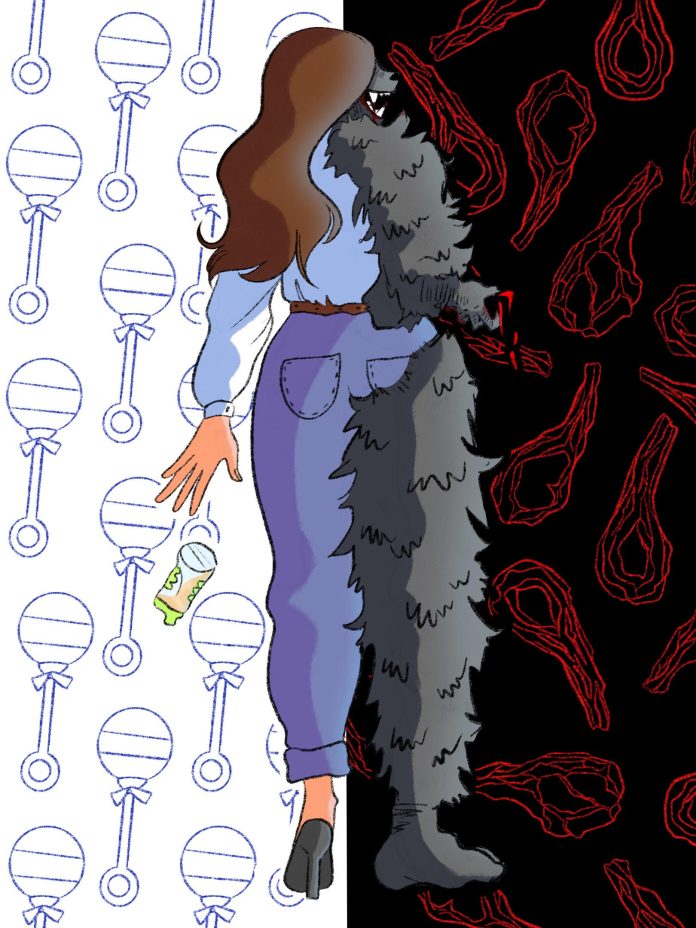Jennifer Sor
Arts & Entertainment Editor
In Rachel Yoder’s debut novel, “Nightbitch,” the unnamed protagonist is used to feeling invisible: a middle-class, middle-aged mother, she’s exhausted, raising her toddler alone in the suburbs. Her husband is never home, trotting off on work trips that last for weeks. Her bitterness is unspeakable. She misses her career. She’s tired of taking her son to Book Babies.
The resentment is too much to handle until she begins to turn into — a dog? Inexplicably, she looks into the mirror and finds her canines sharper and her eyebrows furrier. She begins dreaming of raw meat, wagging her tail, sinking her teeth in something, and rolling around in the backyard mud. Why not? With nothing else to look forward to, why wouldn’t she want to be a dog?
Her transformation from stay-at-home mom into Nightbitch — the word she uses to describe her dog state — is slow, bizarre, and utterly fascinating to witness. While the concept of animal transformation is nothing new (think of Kafka’s “Metamorphosis” or the 2008 “Twilight” franchise), Yoder’s decision to portray it within the context of motherhood is startlingly unique, bringing a feminist perspective to the trope. “Mother” evokes warmth and cleanliness — not blood or dirt or gore — and that’s exactly the point. More than anything, “Nightbitch” is a book of opposites, of unsaid truths. Yoder forces readers to look at womanhood not for what it’s stereotyped to be, but for what we’re afraid to admit about it: the financial subjugation. The loss of one’s identity. And above all, the suffering those experiences entail.
That is the sad beauty of the novel: Yoder is brutally honest about the female experience. Nightbitch isn’t what we would call a “strong” female character — she’s dependent on her husband and deeply passive about her life — but in lieu, she offers readers a complexity and vulnerability that feels very real. She misses her husband, and at the same time, hates him for never being there. She loves her son, yet looks back wistfully at her pre-baby years, her pre-baby body. Nightbitch is every modern woman: a walking, talking contradiction; a contradiction so pervasive the only way of making sense of it is to split herself in two.
The analogy makes a fascinating social critique, winning major points for creativity as well as style. “I am interested in longing, in longing so deep it threatens to splinter a person apart,” Nightbitch writes in a letter, one of the book’s most memorable passages. Yoder’s writing is absolutely beautiful, balancing contradictions in itself: whimsical yet heavy-hearted, blunt, yet cryptic. “I am interested in a profound longing for an unknown existence, or for a better life, without any specifics of what that life would look like.” Every page is rich with feeling. As she denigrates into her animal self, Nightbitch’s languid descriptions have a way of speaking to the freedom everyone wants in life — irrespective of gender.
A book you can read again and still feel like it’s beyond you, “Nightbitch” admittedly feels long, despite being under 300 pages. Although its language and subject matter are endlessly captivating, readers can sense Yoder’s ambition as the novel progresses, which feels like it’s trying to tackle too much. Nightbitch is a dog, but at the same time, represents so much more: a façade, an unfulfilled expectation, the selfishness that keeps a person alive. There’s so much material it feels impossible to intellectualize it all — only to listen and relate.
Thought-provoking and one-of-a-kind, “Nightbitch” warrants a read, and then a second read. (At least, I’ll be reading it again.)











